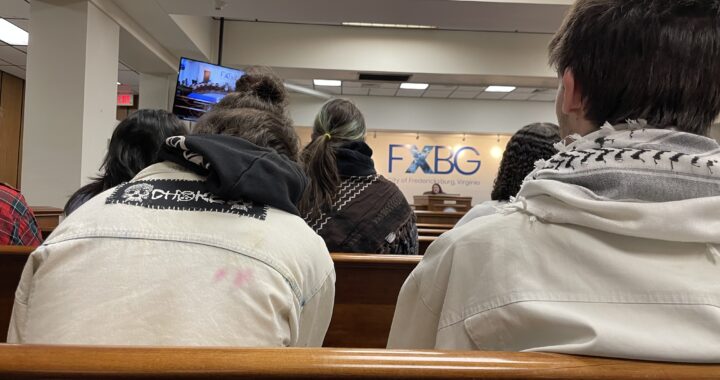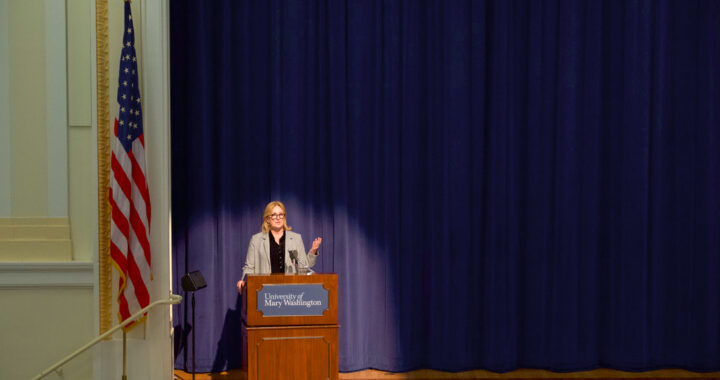Students Go Age Over Primatologist
3 min readBY LAUREN JURGENSEN
Dodd Auditorium erupted with laughter last Friday when leading primatologist Frans de Waal compared a photograph of Dick Cheney, George W. Bush and Donald Rumsfeld to the behavior of a group of chimpanzees.
de Waal, an expert on the social behavior and intelligence of common chimpanzees and bonobos, was at the University of Mary Washington to demonstrate how his study of primates has led him to a deeper understanding of human behavior. According to him, Cheney, Bush and Rumsfeld were exhibiting the same body language that alpha male chimpanzees do when asserting their dominance.
“This is the story of all chimpanzee communities that we know,” said de Waal, referring to Bush’s posture, or bipedal swagger – a side-to-side swaying motion found in dominant male primates. “It shows you how extremely important physical attributes are in politics.”
de Waal’s lecture, “Our Inner Ape: What Primate Behavior Tells us about Human Nature,” covered the numerous parallels that de Waal has found between humans and primates in peacemaking, politics, power, sex and empathy. He argued that the human’s close biological relationship to the chimpanzee accounts for many of the similar behavioral and psychological traits found in humans today.
“The chimp is our closest relative,” said de Waal, who was recently included on the Time 100 List for 2007. “If you look at the DNA, the chimp is closer to us than it is to the gorilla.”
Many other examples de Waal used to support his argument were also borrowed from current national politics.
“Obama and Hillary, I don’t see much love between them. But if one of them wins, they will have to reconcile,” de Waal said, referring to the peacemaking procedure that is common among primates, but not non-primates. “Reconciliation is a physical phenomenon. Chimps embrace and kiss after a fight.”
de Waal also compared the sexual behavior of chimpanzees to those of humans, stating that while males compete over the control of mates, females tend to look for the most high-quality mates. In bonobo chimpanzees, sex is also a release of tension after a dispute.
“The most predictable way to get bonobos to have sex is to introduce food, because food introduces tension and tension leads to sex,” said de Waal, who showed a video clip of bonobos engaging in sexual intercourse while at the same time eating fruit. “There you go… multitasking!”
de Waal, who is Dutch, received his Ph.D. in 1977 from the University of Utrecht after being trained as both a zoologist and an ethologist at three other Dutch universities. He is currently the C.H. Candler Professor of Psychology at Emory University, as well as the director of the Living Links Center, a research institute whose mission is to use primate studies to shed light on human evolution.
de Waal is an author as well, publishing seven critically acclaimed books, including “Our Inner Ape.” Several audience members remained behind after the lecture in hopes of getting this particular book autographed by the visiting speaker.
Dr. Andrew Dolby of the Department of Biological Sciences coordinated de Waal’s visit and served as the introductory speaker at the event. Dolby says that he was so impressed by de Waal’s book that he invited him to the university on impulse.
“What’s amazing about de Waal is that he’s both an incredibly prolific scientist and someone who can communicate science to the public in an engaging way,” said Dolby. “By conducting comparative research with other apes, I think he presents a clear picture of the factors that truly motivate us. His advice is sought after by politicians, military leaders, economists… so his work extends far beyond science.”
Dr. Tim Crippen of the Department of Sociology and Anthropology, who assisted Dolby in planning the visit, was also impressed with the lecture.
“I’ve long been acquainted with his work,” said Crippen. “And I knew that if he spoke as well as he wrote, we’d be in for an entertaining evening. My only surprise was that his presentation was even better than I had anticipated.”
de Waal’s book is available for sale in the UMW bookstore.











